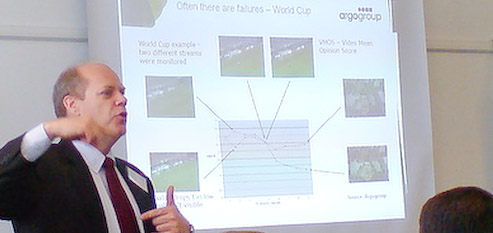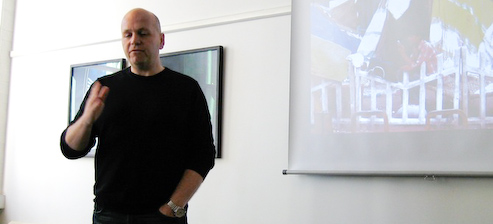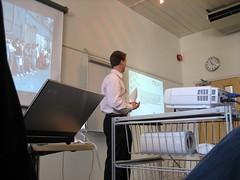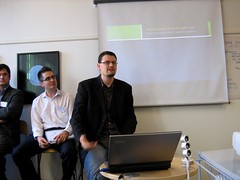 MEX CONFERENCE, LONDON — Paul Kompfner, Head of Development for ERTICO spoke in response to the following MEX manifesto point:
MEX CONFERENCE, LONDON — Paul Kompfner, Head of Development for ERTICO spoke in response to the following MEX manifesto point:
“The world is gaining embedded intelligence. The mobile industry faces a fundamental user experience challenge to make handsets as effective as communicating with the environment as they are with other humans. We think the connection of millions of machines to wireless communication networks represents the most significant generational change since the introduction of packet data.”
Imagine this: As you approach your vehicle, technology in your mobile phone interfaces with the car. It authenticates and unlocks for you. The seats, mirrors, radio stations adjust to your presets as you settle into the vehicle.
You start the car without need for a key. Your media in your device syncs with the larger capacity and capability of the vehicle. As you rocket down the highway listening to a favorite podcast, a call comes in. The volume reduces and you’re able to press a key on your steering wheel to take the call, never having had to take your eyes off the road.
Suddenly carrying around a device in our hand feels only mildly mobile. How does a user’s needs change when moving down a highway at 100mph? The automobile is the next frontier for the mobile user experience. Getting the experience right can mean the difference between life and death.
Continue Reading »
Add this to digg, del.icio.us, etc.
 MEX CONFERENCE, LONDON — Antti Ohrling, co-founder of Blyk kicked off the second day of the MEX conference with his views on understanding the importance of user experience in delivering mobile advertising. Ohrling’s core belief is that mobile advertising is successful only if it is relevant and contextual: the consumer must see it as a benefit, rather than a distraction.
MEX CONFERENCE, LONDON — Antti Ohrling, co-founder of Blyk kicked off the second day of the MEX conference with his views on understanding the importance of user experience in delivering mobile advertising. Ohrling’s core belief is that mobile advertising is successful only if it is relevant and contextual: the consumer must see it as a benefit, rather than a distraction.
Ohrling used his presentation to discredit 3 commonly held myths about advertising in the mobile context, based on his experience with Blyk and on customer surveys Blyk has recently conducted. First he pointed out that the target audience for mobile advertising is a 19-year-old male, 80% of whom are paying their own monthly mobile phone bill.
Myth #1: Content is King
By this Ohrling means the use of content as a platform to delivery advertising. A January 2007 survey of 619 mobile phone users aged 16 to 24 year-old asked them what they do most with their mobile phones:
- Voice
- Text
- Alarm clock
73% do not use mobile data services. 2/3 said they use mobile data services once a month or less, which in essence means that they don’t use it at all. Tying a mobile advertising campaign to WAP-based content that requires the consumer to access via the browser on their device is thus not a sound decision.
Continue Reading »
Add this to digg, del.icio.us, etc.

MEX CONFERENCE, LONDON — Paul Nerger, Vice President of Worldwide Sales & Marketing at Argogroup, spoke in response to the following manifesto point:
“User experience performance must be measured if it is to be improved. It must be constantly tracked through quantitative and qualitative methods. We think organizations throughout the value chain are failing to recognize the importance of understanding customers because quantifying the return on investment is too difficult”.
Paul started his talk by illustrating Argogroup’s services through case studies. One highlighted a “false event”, a momentary spike in service that results in temporary failures. Typical SMS-based false events include New Year Eve and the Super Bowl. So many people send New Year’s greetings to their family and friends at the stroke of midnight or to trash talk during the last few minutes of the Super Bowl that service spikes, resulting in high levels of data usage. When these patterns are not anticipated by carrier’s operations centers performance of the SMS service is drastically impacted, with message delivery unreasonably delayed. In some instances messages are not delivered at all.
Continue Reading »
Add this to digg, del.icio.us, etc.
MEX CONFERENCE, LONDON — The second session of the first day of the MEX conference examined the evolution of community services and social networking in the mobile environment. This session was in a panel format, meaning that following the speaker, discussion took place among subject matter “experts” invited to weigh in on the topic. I was fortunate to be one of the members of this panel, along with Frederick Ghahramani of AirG, Neil Cox of the CMO Council and Antonio Vince Staybil of GoFresh and itsmy.com.
Although only a very small percentage of Vodafone’s subscribers use its mobile internet and content services, Al pointed out that that represents about 4 million users. He expects these numbers to grow as the range of content offered on the mobile internet grows and becomes easier to access via mobile devices.
Al was candid in his talk about the challenges Vodafone has faced in translating a community experience from one context, that of the fixed or PC-based internet, to mobile. He astutely reasoned that a literal translation won’t be succesful and that only those aspects of the PC experience that are meaningful in the mobile context should constitute the mobile experience.
Continue Reading »
Add this to digg, del.icio.us, etc.

MEX CONFERENCE, LONDON — Well the day has wound to a close here in London, and my mind is a-swirl with new ideas for the mobile experience. The format of this conference is rather refreshing, with a mixture of speakers, panel discussions, and group breakout sessions, which has been conducive for both keeping things interesting and providing opportunities for much-needed elbow-rubbing with other like minds shaping the mobile space.
The day kicked off this morning with Cliff Crosbie, Global Director of Retail Marketing for Nokia. Cliff has spent many years working in the retail space, and asked us the question, “When does exceptional service happen?” He pointed out that the big idea, the big brand, rests in the hands of the young person who is working in the mobile retail environment. It’s on them to deliver on the brand promise, which may be difficult if they are distracted, disenfranchised, or simply not knowledgable about the product.
Cliff quoted a recent article from The Sun, which said that “owning a mobile phone can improve living standards more than being given the right to vote.”
Continue Reading »
Add this to digg, del.icio.us, etc.
MEX CONFERENCE, LONDON — Paul Kompfner, Head of Development for ERTICO spoke in response to the following MEX manifesto point:

 MEX CONFERENCE, LONDON — Antti Ohrling, co-founder of Blyk kicked off the second day of the MEX conference with his views on understanding the importance of user experience in delivering mobile advertising. Ohrling’s core belief is that mobile advertising is successful only if it is relevant and contextual: the consumer must see it as a benefit, rather than a distraction.
MEX CONFERENCE, LONDON — Antti Ohrling, co-founder of Blyk kicked off the second day of the MEX conference with his views on understanding the importance of user experience in delivering mobile advertising. Ohrling’s core belief is that mobile advertising is successful only if it is relevant and contextual: the consumer must see it as a benefit, rather than a distraction.




